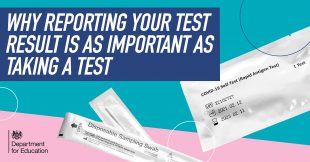Why reporting your test result is as important as taking a test

As children begin to return from the Easter break, we’ve outlined why reporting a test result is a crucial part of our fight against COVID-19.
We need to understand the amount of Covid circulating in the (school) community
We cannot get a clear picture of COVID-19 rates within the community if tests are not reported. This includes reporting negative test results, of which most tests are.
Staff, students and pupils should share their result, whether void, positive or negative, with Test and Trace and their education setting to help with contact tracing.
Reporting your result helps the NHS monitor the spread of the virus, combat the virus and save lives. It also enables support to be given to communities across the UK.
Reporting testing will not lead to more school closures
Instead, by reporting tests, staff, students and pupils are able to help councils and local health officials understand the community rates of infection better, enabling them to identify any possible outbreaks early and to take appropriate action in order to help to break chains of transmission.
It is also important to report test results so that contact tracing beyond the school environment can take place, and clinical evaluation of the testing programme can be undertaken effectively.
Staff, students and pupils should share results with their school so that if positive, immediate contact tracing can take place in school. Void and negative results are also useful information for schools both to monitor stocks of kits and to identify any issues that might need escalating to DfE or NHS Test & Trace.
You can report test results from your mobile as well as online
It is important to report your result online straight away, even if it is negative or invalid. It’s easy to do at https://www.gov.uk/report-covid19-result.
Recording all results helps us get a better understanding of the spread of the virus across the country. If we only record positive results, the level of COVID-19 cases will look worse than they really are. Scientists use the information to spot patterns and outbreaks more quickly and accurately; helping reduce the risk of future lockdowns.
You can also report results by calling the phone number in your test kit’s instructions or by calling 119 (free from mobiles and landlines). Lines are open every day, 7am to 11pm.
Test and trace support payments are available to eligible parents who are asked to isolate as a result of their child’s need to isolate
We understand how important it is for parents to be supported during this period, especially if a child tests positive for COVID-19.
Parents whose children are asked to self-isolate after contact with a positive case of COVID-19 are included in the Test and Trace Support Payment Scheme if they are unable to work as a result.
The Test and Trace Support Payment scheme, which provides a £500 payment to those on certain benefits or low incomes who are required to self-isolate, has been extended to the parents and carers of children who cannot work because their child or children are required to self-isolate.
Parents and carers will need to apply via their local authority in which they live to receive a payment and will need to either provide their child’s NHS Test and Trace Account ID, or a communication from their early years provider/school informing them that their child needs to self-isolate.
To be eligible parents and carers must meet the following requirements:
- They are the parent or guardian of a child or young person in the same household and need to take time off work to care for them while they self-isolate. This is limited to one parent or guardian per household for the child or young person’s self-isolation period
- They are employed or self-employed
- They cannot work from home while undertaking caring responsibilities and will lose income as a result.











Responses